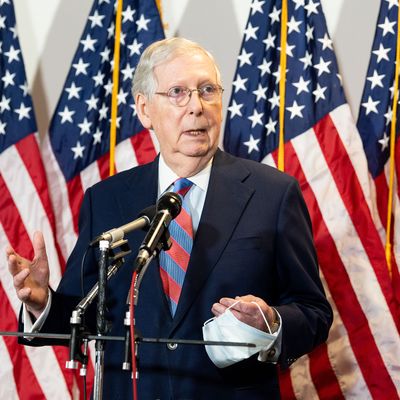
Senate Republicans reacted to yesterday’s introduction of House Democratic legislation providing a new $3 trillion round of coronavirus stimulus money with a combination of silence and mockery. Until recently the party line has been that Congress should “pause” in its relief measures until the results of earlier stimulus bills have been absorbed and evaluated. But while some GOP senators scorned Nancy Pelosi’s bill as a “wish list” they won’t dignify with more detailed commentary, there’s also some talk about the Senate eventually acting, as The Hill reports:
McConnell on Tuesday subtly shifted from last week’s call for a pause by instead emphasizing the need for additional coronavirus legislation to be “narrowly targeted.”
“We’re going to insist on doing narrowly targeted legislation if and when we do legislate again, and we may well,” he told reporters.
Trouble is, what appears to be motivating the Republican solons is not the frantic cries of those needing medical services or unemployment checks or help with rent or house payments, or the vast numbers of state and local government employees facing layoffs in the near future. No: it’s Corporate America’s pain that could end the “pause:”
Two core proposals have emerged from Republican senators so far: a litigation shield for businesses that reopen while the pandemic is still going strong and a reform of beefed-up unemployment benefits that Congress approved in March that critics say are making it tougher to hire lower- and middle-income workers.
Sen. John Cornyn (R-Texas), a member of the Senate Judiciary Committee who has been tasked with overseeing the litigation reform effort, said the GOP plan could be unveiled in the next several days along with a proposal to give unemployed workers more incentive to rejoin the labor force.
The unemployment benefit “reform” is likely a reduction of benefits to make people more anxious to go back to low-paying and potentially dangerous jobs. And the liability shield is designed to make sure any damages attributable to the performance of those dangerous jobs isn’t born by The Man, more than is minimally necessary.
Now you don’t have to be a political genius to understand that a coronavirus bill limited to these two proposals isn’t going to inspire dancing in the streets, even among MAGA fans. So the big immediate question is whether Senate Republicans can find something more popular into which to nestle these little legislative stink bombs, and the even bigger question a bit down the road is whether House Democrats will accept any version of them no matter how many concessions they get in exchange.
There has been some discussion in Democratic circles of accepting a liability shield in exchange for federal regulatory activism in improving workplace safety, which would presumably make lawsuits less numerous and essential, as the Wall Street Journal reported earlier this month:
Rep. Ro Khanna (D., Calif.), who is pushing legislation that would require OSHA to force companies to develop worksite-specific coronavirus-protection plans, said he would be open to a liability shield for companies that comply with strong mandates.
“I certainly don’t think that you can have immunity without the protections for workers,” Mr. Khanna said, adding that government guidelines are inadequate. “We need a clear legislative direction of what worker safety looks like, especially during the Covid crisis,” he said.
You certainly cannot expect the Trump administration to move in that direction with a big congressional push.
Democrats are interested in protecting hospitals and other health-care providers from liability, and there’s movement towards state liability shields (which a federal shield would likely preempt). At one point McConnell suggested that enactment of such shields might become a condition for receiving additional coronavirus relief funding.
But the bottom line is that Republicans will need either Democratic cooperation in providing the corporate relief they crave, as part of a bigger deal, or the kind of regular-American-friendly sweeteners that might obscure their motives. Everyone understands the pandemic and the economic fallout constitute a huge national crisis in an election year, so you might expect the unexpected, so long as you don’t expect Republicans to stop conflating the welfare of CEOs with those far down the food chain.






























